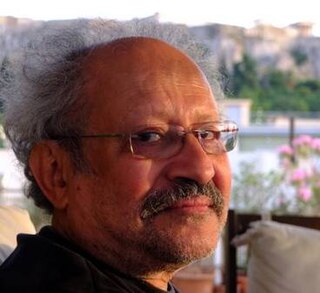Related Research Articles

Clarence Albertson Barlow was a British composer of classical and electroacoustic works. He was an academic teacher internationally, at the Royal Conservatory of The Hague from 1990 and at the University of California, Santa Barbara, from 2006, among others. He taught at the Darmstädter Ferienkurse from 1982 to 1994.
Gottfried Michael Koenig was a German-Dutch composer.
Hanspeter Kyburz is a contemporary Swiss composer of classical music, known for applying electronic music techniques to his productions.
York Höller is a German composer and professor of composition at the Hochschule für Musik Köln.
John McGuire is an American composer, pianist, organist, and music editor.
Isabel Mundry is a German composer.

Sandeep Bhagwati is a German composer of western classical music and an academic teacher.
Mark Andre is a French composer living in Germany. He was known as "Marc André", his birth name, until 2007, when he formally revised the spelling. He lives in Berlin. Andre's compositions durch (2006), ...auf... III (2007), and Wunderzaichen (2014) received multiple votes in a 2017 Classic Voice poll of the greatest works of art music since 2000.
Annesley Black is a Canadian composer based in Germany and Austria. Her works span from instrumental music to electronics and video performances, from orchestra and chamber music to theatre, solo performances and installations. She has appeared as a performer, improviser and sound-director.

Gordon Kampe is a German composer and academic teacher.
Günter Steinke is a German composer and teacher. He is currently professor of instrumental composition at the Folkwang University of the Arts in Essen, Germany.
Albrecht Riethmüller is a German musicologist.
Elmar Budde is a German musicologist. He studied at the Universität der Künste Berlin.
Matthias Brzoska is a German musicologist. He researched and taught at the Folkwang University of the Arts in Essen.
Gösta Neuwirth is an Austrian musicologist, composer and academic teacher. He studied in Vienna and Berlin, where he wrote a dissertation on harmony in Franz Schreker's Der ferne Klang. He has taught at universities and music schools including the Musikhochschule Graz, University of Graz, Hochschule der Künste Berlin and University of Freiburg. His compositions include a string quartet and a chamber opera.
Elisabeth Schmierer is a German musicologist. She researches and teaches at the Folkwang University of the Arts in Essen.
Michael Heinemann is a German musicologist and university professor.
Daniel Ott is a Swiss composer.
Kathinka Rebling was a German violinist and musicologist.

Wilfried Gruhn is a German violinist, musicologist, music educator, and professor emeritus at universities in Germany and abroad. His focus is the music education of small children. He founded and directed the Gordon Institute of early childhood music learning in Freiburg in 2003. He is engaged in several international organisations such as International Society for Music Education (ISME) and the Internationale Leo Kestenberg Gesellschaft which published Leo Kestenberg's complete writings in six volumes.
References
- ↑ Interview with Finnendhal on ZKM
- ↑ Orm Finnendhal on the BBC
- ↑ Orm Finnendahl on soundcloud.com